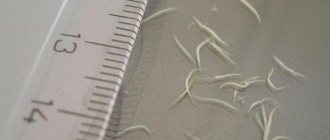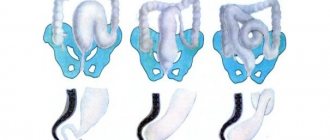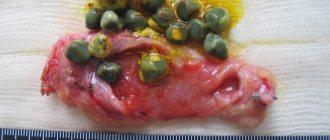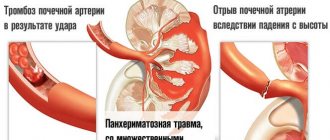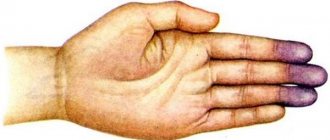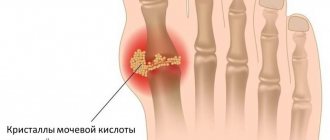Worms are a topic that is not usually discussed in polite society. Indeed, there is little pleasant in helminths, and many believe that becoming infected with them is a great shame.
In fact, every person in his life runs the risk of getting helminthiasis - this is the name of the disease in which the body is parasitized by worms, called helminths or simply worms.
Of course, helminthiasis must be treated. It is equally important to take preventive measures to prevent worm eggs from entering the body. In this article we will answer questions about how to do this.
Symptoms of helminthiasis: how to understand that there is a “stranger” inside you?
There are many signs of worm infection, and we will list the main ones. If you notice at least a few of the symptoms, you should consult a doctor:
- itching in the anus and genital area (typical of pinworm infection);
- urticaria - redness of the skin and rashes on it (allergic reaction to helminths);
- swelling of the mucous membranes (also observed due to exposure to allergens);
- abdominal pain, nausea, changes in appetite (increase or decrease), rapid weight loss;
- diarrhea, constipation, increased gas formation, other stool disorders;
- changes in blood composition;
- weakness, fatigue, dizziness;
- headache;
- enlarged lymph nodes, liver and spleen;
- pain in joints and muscles;
- blood in the urine, frequent urge to urinate;
- dry cough, shortness of breath;
- constantly elevated temperature.
However, there are cases when helminthiasis is asymptomatic for a long time. We recommend that you pay maximum attention to your health and make an appointment with a doctor for preventative measures. This is especially true after traveling to countries famous for unsanitary conditions.
Important diagnostics
Modern diagnostic methods make it possible to identify almost all types of parasites. However, cases of infection often remain unsolved. Usually patients do not even think that they could be attacked by worms. After all, weakness, depression, loss of appetite, headaches, allergic reactions can occur with a variety of diseases.
As a result, people are not given the necessary examination, and the true cause of the illness is not revealed. And the person continues to visit doctors and take useless medications.
Therefore, diagnosing parasitic infections is very important. Especially in cases where the diagnosis is not fully understood, treatment does not help the person well, and complaints remain.
Helminths: so what are they?
We call worms the simplest round or flat worms that parasitize the body of humans or animals. Experts identify more than 400 species of human worms, of which about 100 species have been found in Russia.
The most famous helminths are, of course, roundworms, pinworms and various types of tapeworms. However, even experts will not be able to list all existing types of worms. Moreover, in exotic countries you can become infected with helminths that are absolutely atypical for our region.
It is precisely because of the variety of worms that it is difficult to give the patient a correct diagnosis. Symptoms of helminthiasis can resemble manifestations of various diseases, depending on which particular parasite has entered the body.
In addition, a person can suffer from several types of helminths at the same time, which further complicates the clinical picture and has a detrimental effect on the patient’s condition.
Based on the places in which the worms are localized, they are divided into:
- cavity or luminal - living in different parts of the intestine (pinworms, whipworms, dwarf tapeworms, broad tapeworms);
- tissue - choosing body tissues as their habitat (muscles, lungs, heart, liver, skin, eyes, etc.).
The roundworms we all know can be classified as both types of helminths. Most often they live in the intestines, but sometimes roundworm eggs travel through the bloodstream to other organs of the body and develop there.
According to the World Health Organization, every second inhabitant of the Earth becomes infected with helminths every year without knowing it. Some Russian and foreign researchers come to the conclusion that certain parasites can be found in the bodies of 95% of people.
Symptoms
There are a lot of symptoms, and individual manifestations depend on which helminth eggs have entered the body. Next, we will talk about the general symptoms for all parasitic infections, and then about enterobiasis, ascariasis and 5 other types of infections.
General symptoms:
- increased irritability, restless sleep, decreased perseverance and attentiveness, frequent hysterics and anger;
- increased appetite associated with active weight loss;
- symptoms from the digestive system - diarrhea, constipation, nausea, pain in the right hypochondrium;
- dizziness and headache;
- food allergies;
- nasal discharge;
- diseases and infections of the reproductive system;
- brittle nails/hair;
Enterobiasis is a helminthiasis in which the body is infected by pinworms. The larvae emerge from the eggs within 4-6 hours; in 2-4 weeks they become adults - grayish or white roundworms 5-10 mm long. They settle in the cecum and appendix, and lay eggs outside the anus - at night, female pinworms come out into the air for this purpose. This reproduction mechanism leads to severe itching at night - hence restless sleep, tossing and turning, and screaming.
Additional special symptoms:
- night urination;
- grinding teeth;
Ascariasis is a helminthiasis in which the body is colonized by roundworms. These worms are already larger - the average length of an adult is 25-30 cm. The larvae and eggs enter the body with insufficiently disinfected fresh fruits and vegetables. The development period takes place in the intestines, after which they pass into the lymphatic and blood vessels, and with the flow of blood and lymph they are distributed throughout the body - in the liver, heart, lungs. They then enter the oral cavity and are re-swallowed. From this moment, adult roundworms begin to develop. This takes approximately 3 months.
How to suspect the presence of worms in children:
- the liver, spleen, lymph nodes enlarge;
- the temperature rises, sometimes up to 38 degrees;
- malaise and weakness appear;
- respiratory pathologies develop - pneumonia, bronchitis and bronchial asthma;
- pressure drops;
- Gastrointestinal symptoms appear - constipation, diarrhea, nausea and vomiting, pain in the form of contractions;
- fear of light;
- nightmares at night;
- dry cough - sputum with an orange tint and bloody spots.
It is more difficult to breed roundworms than pinworms, since the female lays almost 250 thousand eggs every day. In no case should you rely on traditional methods or buy the first remedy you come across at the pharmacy - be sure to contact a specialist.
These are not all worms in children that inhabit the body. There are more than 300 species of helminths in the world, and 70 of them are found in Russia alone. In addition to the two listed types, 5 more types are becoming widespread:
- trichocephalosis - characterized by a lag in both physical and intellectual development, but in general it is almost asymptomatic;
- opisthorchiasis – the temperature rises, the nodes of the lymphatic system enlarge, skin rashes appear;
- hymenolepiasis – the main consequence is rhinitis;
- toxocariasis - has many symptoms that distinguish it from other helminth infections: keratitis, cough with suffocation, ophthalmitis, chorioretinitis, facial swelling;
- wide tapeworm - characterized by anemia, intestinal disorders, pain in the abdominal area.
Infants may experience symptoms after just a few weeks of life if they have received the eggs and larvae of worms from their mother, for example during childbirth. As a rule, symptoms manifest themselves in the form of lack of weight gain, excessive drooling, rash, pallor, blue under the eyes, constipation. The child is constantly worried, screams, sleeps and eats poorly. The screaming can be unbearable and the baby will turn blue in the process.
Worms are often the cause of the development of pulmonary pathologies and are diagnosed using ultrasound or x-ray. Parasites, in particular Echinococcus tapeworm, can damage not only the respiratory system, but also move further to the brain and heart. In areas where helminths develop in the lungs, scars and adhesions appear, and the shape of the lungs begins to change. Such changes provoke a wide range of diseases - asthma, fibrosis, bronchitis, pleurisy, emphysema, etc. When a tapeworm enters the lungs, echinococcosis is formed, when the parasite develops in the form of a cyst.
Symptoms will largely depend on which helminth has entered the body, but the child’s anxiety and the presence of the above general symptoms should alert parents. If signs of worms appear, make an appointment with a pediatrician or gastroenterologist to get tested in a timely manner.
Ways of helminths entering the body
There are several of them, but the most common ways are four:
- From person or animal to person. This is how, for example, pinworm infection occurs. If a person infected with this type of worms touches various objects without washing their hands, then this will become a risk factor for others (it is not without reason that enterobiasis - and this is what pinworm infection is called - is an occupational disease of teachers, because pinworms are a real scourge of primary schoolchildren) .
- Through the soil. Worm eggs enter it along with human and animal feces, after which they are carried by water, insects, pets or wind (with dust particles) and end up on food or directly into the digestive tract or respiratory tract.
- When eating food that has not been subjected to heat treatment. Raw or half-raw meat or fish infected with worms are very dangerous. Therefore, you should very carefully choose restaurants that serve sushi.
- For insect bites. This happens quite rarely, but the risk of contracting helminthiasis through a bite increases when traveling to exotic countries.
What diagnostic methods will help detect worms?
An examination for parasitic infections is prescribed by an infectious disease specialist or helminthologist.
In order to find out whether there are worms, you can use the following laboratory and instrumental research methods:
- Microscopic examination of feces for helminth eggs is carried out using a preparation from a drop of feces processed by various methods (naive smear, Fullenborn test, Taleman test). Diagnostics, if necessary, is carried out in several stages.
- Complete blood count - helminthiasis is characterized by an increase in the level of eosinophils (normal 0-1), a change in the number of leukocytes.
- Immunological examination of blood serum - when a helminthic invasion is introduced into the body, it begins to protect itself from it by secreting antibodies; these cells are specific for each group of parasites.
- Muscle biopsy - if trichinosis is suspected, muscle tissue is examined for the presence of Trichinella larvae.
- Sputum analysis for ascaris eggs - if ascariasis is suspected in combination with a cough, a short-term stay of ascaris larvae in the respiratory system, in particular in the bronchi, lungs, and oral cavity is possible.
- X-ray examination of the lungs - carried out if ascariasis is suspected; a characteristic sign is the movement of dark spots in the lungs on a repeat image (the result of migration of parasites through the lung tissue);
- Ultrasound, CT scan of the abdominal organs - helps to detect hydatid cysts and the presence of alveococcosis.
- FGDS with examination of the contents of the duodenum can detect hookworm disease.
- Scraping for enterobiasis - the anal imprint is examined using adhesive tape or a cotton swab. This is how pinworm eggs are collected, which were laid near the anus by adult individuals during the night sleep of an infected person.
Based on the results of the study, the doctor prescribes treatment and monitors its effectiveness.
Helminthiasis - a childhood disease?
Worms are often considered a childhood disease. The reason for this is that children often do not follow the simplest hygiene requirements: they do not wash their hands when coming from the street, after visiting the toilet or petting an animal, they eat dirty fruits and vegetables, and they may drink unboiled water. Kids, in addition, get to know the world by testing it by taste - they, as you know, put everything they can reach into their mouths. This is how parasite eggs enter the body.
The facts today are as follows: yes, children suffer from helminthiasis more often than adults. But this does not mean that advanced age is insurance against the penetration of worms into the body.
Description of the disease
Helminthic infestation or helminthiasis (damage to the body by worms) is a widespread phenomenon in childhood. Few children have not suffered from helminthiasis at least once in their life. Manifestations of the disease, as a rule, are known to everyone: the child suffers from itching in the anus (intensified at night), stomach upset, loss of appetite, and a feeling of fatigue.
While in the intestines, the worms feed at the expense of the host’s body, affecting internal organs and systems. Currently, more than 300 varieties of worms are known. The most common in childhood are pinworms and roundworms.
Helminthic infestation requires immediate treatment by a qualified gastroenterologist. While in the child’s body, worms disrupt the process of absorption of nutrients, their waste products have a negative effect on the gastrointestinal tract, and, if left untreated, can affect other vital organs - the lungs, brain, etc.
How dangerous are worms?
A reasonable question: if the worms will most likely disappear on their own after some time, is it worth treating them? Doctors answer: this step is necessary.
Some types of worms have a very long lifespan and during this time they will have time to harm our health. But even parasites such as pinworms, which die after about a month, are harmful to the body.
Possible consequences of infection:
- The waste products of worms act on the human body as poisons or allergens, reducing overall well-being. An allergic reaction, in turn, can lead to Quincke's edema and death.
- Living in human tissues and organs, helminths damage them mechanically and interfere with normal functioning.
- Worm larvae, migrating throughout the body in the bloodstream or entering the respiratory tract, can clog blood vessels and cause bronchial obstruction.
- Some types of helminths disrupt the digestive process, which can lead to severe poisoning.
- Experts have discovered that there are helminths that cause cancer.
Worms are the most dangerous for children: in addition to a huge range of diseases and decreased immunity, they can cause developmental delays, both physical and mental.
Complications (helminthic infestation)
It is important for parents to both understand in a timely manner that their child has symptoms of worms and to carefully follow all the doctor’s recommendations. Only in this case can unpleasant and even life-threatening complications be avoided:
- intestinal obstruction;
- jaundice caused by blockage of the bile ducts;
- pancreatitis;
- pustular skin lesions;
- appendicitis;
- acute pulmonary failure;
- eye damage, accompanied by decreased visual acuity and development of strabismus;
- damage to the intestinal wall, peritonitis;
- encephalitis, megingoencephalitis, etc.
Treatment of helminthiasis
Having determined the presence of parasites in the body, the doctor develops a course of treatment based on which worms have “settled” in the person, and prescribes the necessary medications.
Some people believe that you can use “grandmother’s remedies” (for example, eating garlic) and thereby get rid of “uninvited guests”. But, as we have already said, helminths are diverse, and only a doctor, after conducting all the necessary research, can confidently conclude what type of helminthiasis the patient suffers from and how it should be treated.
SMC Best Clinic has everything you need to conduct laboratory tests, and our doctors have extensive knowledge about helminths and the treatment of helminthiasis. You can safely entrust your health to us.
It is possible to defeat parasites!
Antiparasitic Complex® - Reliable and safe removal of parasites in 21 days!
- The composition includes only natural ingredients;
- Does not cause side effects;
- Absolutely safe;
- Protects the liver, heart, lungs, stomach, skin from parasites;
- Removes waste products of parasites from the body.
- Effectively destroys most types of helminths in 21 days.
There is now a preferential program for free packaging. Read expert opinion.
Read further:
Fasciola Hepatica (liver fluke): structure of the parasite, life cycle of development and treatment
What worms look like in children: roundworms, pinworms, flukes and tapeworms
What cat worms look like: what worms do cats get and how to recognize them
Where does the roundworm larva develop: stages of development of the human roundworm
Long worms in cats: main types, description and methods of treating parasites in cats
Allergies and worms in children: what helminths cause it and how to treat it
Preventive measures against worms
In order not to become infected with helminths, you need to remember about hygiene: always wash your hands, vegetables and fruits, get rid of the habit of wetting your fingers with saliva when turning pages, and generally putting your hands to your mouth, do not try foods in markets, eat with caution in unfamiliar restaurants and regularly take shower.
These measures, however, do not guarantee complete protection against worms - this should not be forgotten. Therefore, get tested at least once a year and be sure that there are no “dangerous residents” in your body.
Treatment of worms with folk remedies
Traditional recipes also help get rid of parasitic worms, but it is better to combine them with medications. On their own, they act more slowly and not always fully, that is, to achieve the desired result, more than one course will be required.
Onion and garlic
Onions are effective against pinworms, lamblia, and roundworms, killing them in one or two applications. Garlic will help get rid of any worms, but is contraindicated in case of exacerbation of gastrointestinal diseases, epilepsy and liver failure.
Recipes with garlic and onions:
- Crush one large onion, pour a glass of boiling water, leave for 10 hours. Drink the medicine once in the morning on an empty stomach. The course can be repeated in a week.
- A few cloves of garlic (55 g) need to be crushed and poured with 250 ml of vodka and left for a week. Drink 30 drops three times a day for 14 days.
Walnuts
They help to safely get rid of nematodes and cestodes. Nuts must be used unripe with the peel. Pour four tablespoons of crushed raw materials into a glass of boiling water and leave until cool. Drink the entire volume of the prepared product during the day, divided into three servings. The last portion must be supplemented with a laxative.
Pomegranate
A product with pomegranate peel can be used not only to get rid of parasites, but also to prevent re-infestations. It is prepared like this:
- 5 g of crushed dry peel is poured with boiling water (0.5 l);
- the mixture is put on fire and evaporated so that half of the liquid remains;
- after cooling, the product is drunk in full on an empty stomach;
- After a couple of hours you need to take a drink.
Milk with garlic
Used as an intestinal enema. The product has a gentle effect on the gastrointestinal tract, helping to get rid of worms. Before a therapeutic enema, it is recommended to do a cleansing enema.
The head of the spicy plant must be crushed, pour boiling water (250 ml) and left until it cools. Then strain the tincture and mix with 250 ml of milk.
Milk increases the effectiveness of garlic and has a mild laxative effect.
Pumpkin seeds
This is the most popular and well-known remedy for eliminating worms. To get rid of parasites, use seeds:
- Every day on an empty stomach you need to eat 2 large spoons of ground raw seeds, and after 2 hours take a laxative.
- You need to eat 300 g of seeds once on an empty stomach and after half an hour drink a glass of milk, and then take a laxative.
Pumpkin seeds have no contraindications. However, they should be used with caution by people who have increased acidity in the stomach.
Cognac
An alcoholic drink, when used correctly, will also help get rid of parasitic worms. Every day on an empty stomach you should drink 15 g of alcohol, and after 30 minutes - a tablespoon of castor oil. The course of therapy is 5-7 days.
If you are intolerant to cognac in its pure form, the drink can be mixed with tea or water.
Coffee
To get rid of worms, it is recommended to do coffee enemas. Three tablespoons of natural ground coffee should be brewed in a liter of water. The solution is infused until it cools and filtered. It is advisable to keep it in the intestines for 15-20 minutes. The duration of treatment is 14 days; it can be repeated after a week to prevent relapses.
Wormwood, tansy, yarrow
The bitter plant wormwood has a detrimental effect on all types of worms. To get rid of helminths using dried wormwood, you need to prepare a tincture:
- Pour vodka over the grass in a ratio of 1:3.
- Leave for seven days.
- Take 50 g on an empty stomach for two weeks.
You can also brew the herb with a glass of boiling water and leave until it cools, then divide the product into portions and take throughout the day. Both recipes are very effective and safe, helping to quickly get rid of parasites if you do not violate the dosage.
Products with wormwood are prohibited for pregnant women, as well as during menstruation.
You can get rid of worms at home quickly and without consequences using other medicinal herbs:
- Tansy decoction. The dry herb is ground into powder and mixed with honey in equal proportions. You need to eat 1 tbsp. in the morning and in the evening. This treatment is only suitable for adults. It is recommended to combine the evening dose with an enema or a vehicle.
- Immortelle from tape parasites. 2 large spoons of herbs are brewed with boiling water (0.5 l) and infused in a thermos for 14 hours. Strain and take half a glass three times a day for 7 days.
Cranberry juice
A tasty product will help not only get rid of worms, but also strengthen the immune system in order to quickly eliminate the consequences of the infestation. Cranberry juice is drunk 500-750 ml per day for 3-5 days. Sugar should not be added to the drink.
Infection with worms of mother and child
Doctors do not exclude the possibility of infection of the fetus with worms through placental tissue. In addition, if a woman, while pregnant, was infected with any helminthiasis pathogen, the risk that the child will get sick is very high. It is unlikely that parasites will enter the baby through mother's milk. Worms can enter the baby's body during childbirth, when the baby moves out through the birth canal. Helminthic infestation of mother and child requires complex treatment, while many medications are prohibited for use, so traditional medicine is often used.
Sources
- Bronshtein A.M., Malyshev N.A. Helminth infections of the digestive system: intestinal nematodes, liver trematodes and larval cestodiases (echinococcosis). grew up honey. magazine 2004; 4: 208. / Bronshtein AM, Malyshev NA Gel'mintozy organov pishchevareniia: kishechnye nematodozy, trematodozy liver i larval'nye tsestodozy (ekhinokokkozy). Ros. med. zhurn. 2004; 4:208.
- I.V. Davydova. Helminthiases registered on the territory of the Russian Federation: epidemiological situation, features of parasite biology, pathogenesis, clinic, diagnosis, etiotropic therapy. Consilium Medicum. 2017; 19 (8): 32–40.
- Federal Service for Supervision of Consumer Rights Protection and Human Welfare. How to avoid becoming infected with parasites through fish?
- Crompton DWT; Savioli L. (2007). Handbook of Helminthiasis for Public Health. CRC Press, Boca Raton, Florida, US. pp. 1–362.
- Lustigman S.; Prichard RK; Gazzinelli A.; Grant W.N.; Boatin BA; McCarthy JS; Basáñez MG (2012). “A research agenda for helminth diseases of humans: the problem of helminthiases.” PLOS Neglected Tropical Diseases. 6(4):e1582.
Is it possible to get parasites through bed?
The eggs of pinworms and some other helminths live outside the animal or human body for several months, and in everyday life they can be found on any surfaces touched by the carrier. You can become infected with parasites through bed, dishes, doors, furniture, etc. So, if one family member is infected, then after a short period of time the rest of the household becomes infected. Everyone should get tested and begin timely treatment so as not to continue the spread of helminthiasis among loved ones and those around them.
- Abdominal and waist trainers
- How to determine blood poisoning in a person
- Anticoagulants - what they are and a list of drugs. The use of direct and indirect anticoagulants
Treatment of helminths in children and adults
Despite the abundance of antiparasitic drugs in pharmacies, you cannot take them yourself. By prescribing complex treatment, the doctor strives not only to remove parasites, but also to eliminate the consequences of their vital activity.
As a rule, in addition to anthelmintic drugs, the patient is also prescribed vitamins and other medications that eliminate the symptoms of the disease. The doctor selects medications separately for each patient, because everyone’s symptoms are different.
Preparations for the treatment of helminthiasis
For helminthic infestations, patients are prescribed a complex of the following drugs:
- Anthelmintic drugs. These are anthelmintic drugs that either remove or kill worms. These goals are achieved by disrupting the metabolism of parasites or paralyzing their muscles. In the latter case, they lose the ability to stay in the intestines and are excreted.
- Antihistamines. If the patient is allergic to parasites, then doctors prescribe antiallergic drugs during treatment. This is extremely important, since mass death of worms releases a large number of allergens, which can provoke a severe allergic reaction. Antihistamines block the production of histamine, the main mediator of an allergic reaction.
- Enterosorbents. These are medications that are capable of binding substances in the gastrointestinal tract. During the treatment of worms, enterosorbents are used to bind and remove toxic substances secreted by worms.
- Vitamins and microelements. The most commonly prescribed are B vitamins (folic acid and B12) and iron supplements. This is needed to treat anemia.
- Hepatoprotectors. These are medications that protect the liver from toxic substances. These include preparations based on essential phospholipids or plant materials (milk thistle, artichoke, licorice, St. John's wort, and other plants).
- Probiotics and prebiotics. Prescribed to restore intestinal microflora. Probiotics are live cultures of beneficial bacteria. Prebiotics are indigestible food components (such as fiber) that are fermented only by intestinal flora.
Surgery
In most cases, it is enough to take a combination of medications. However, sometimes doctors are still forced to resort to surgery. For example, a large accumulation of roundworms can cause intestinal obstruction. This is an emergency condition that requires surgical intervention.
Worms can accumulate in the bile duct, causing obstructive jaundice and even liver abscess to develop. The same situation can occur in the pancreas, leading to acute pancreatitis. If worms enter the appendix, appendicitis develops. All of these conditions require prompt surgery.
Surgery is often used when organs are damaged by echinococci. These parasites accumulate, forming echinococcal plugs in the liver, lungs, bones, kidneys and even in the brain.
Folk remedies for worms
Folk remedies for worms are not as effective as anthelmintic drugs. This is only an auxiliary method - the main treatment is prescribed by a doctor.
Folk remedies include pumpkin seeds, which contain cucurbitin, a substance that has an anthelmintic effect.
Myth 2: Garlic enemas get rid of worms
Worms really don’t like garlic, because it contains phytoncides - antibacterial and antiparasitic substances. However, there is no need to do garlic enemas for helminthiasis. There are very few worms in the colon, where the contents of the enema are administered. The majority of parasites live in the small intestine, so this procedure is useless. In addition, such an enema can cause serious irritation of the mucous membrane.
How to quickly get rid of worms with medications
Unwanted “neighbors” need not only to be destroyed, but also to be disposed of in a gentle manner – removed without harm to one’s own body. Treatment of worms is carried out in three stages:
- Preparatory, lasting up to a week. During this time, the body needs to be cleansed of toxic substances and prepared for subsequent treatment. To do this, you should drink 1 teaspoon of pumpkin seed oil three times a day half an hour before meals.
- The main one is that the person takes anthelmintic medications. It is at this time that it is possible to get rid of the worms and completely remove them from the body.
- Restorative – diet and taking vitamins to quickly restore health after anthelmintic therapy.
To get rid of parasites, it is best to resort to a medicinal method of deworming under the supervision of a treating specialist.
There are many effective drugs, but they often cause negative side effects. To avoid them, you must carefully read the instructions and follow all the doctor’s recommendations.
Wormil
Helps get rid of worms in less than one week. Albendazole (active substance) fights all types of parasitic worms.
To get rid of worms, take the medicine before meals without chewing, drinking plenty of water. The dosage is selected individually according to age, weight, and also depending on the form of the disease.
Contraindications:
- pregnancy planning and the process of bearing a child;
- breastfeeding;
- age up to two years.
Dekaris
If you are interested in how to get rid of worms at home in 1 day, then this drug is definitely for you. For adults, taking one tablet (150 mg) at night is enough, and the problem is solved. The dosage is determined individually:
- children 3-6 years old – 25 mg;
- 7-10 years – up to 75 mg;
- 10-18 years – 100 mg.
The active substance Levamisole in the drug helps get rid of roundworms, pinworms, necator and other types of worms. The drug is contraindicated for pregnant and lactating women, as well as people with renal or hepatic dysfunction.
Pirantel
Available in the form of suspension and capsules. The medicine will quickly and effectively help get rid of adult parasites and their larvae. Taken once during a meal. The dosage is selected according to age and depending on the types of worms detected.
This drug is contraindicated in pregnant women, as well as in diagnosed myasthenia gravis.
Praziquantel
Helps to cure and completely get rid of Chinese fluke, broad tapeworm, pork and bovine tapeworm. Available in tablet form. The dosage is selected according to the form and severity of the invasion. Standard: 40-75 mg per kilogram of weight. To get rid of parasites completely, you should take the product for one to two days.
Piperazine
Perhaps this is the only safe medicine today that can be taken during pregnancy without fear for the health of the woman and the unborn child. It helps fight worms by paralyzing their nervous system. It rarely produces side effects, which is why it is considered harmless.
Treatment consists of several courses (the number depends on the severity of the infection), which are carried out at intervals of one to two weeks:
- for children – 1.5 g of the drug per day;
- for adults – 2 years.
Piperazine is contraindicated in people with diseases of the central nervous system. In case of side effects (nausea, headache, tremors of the extremities), you should immediately stop taking it and go to the hospital.
Biltricide
Helps to quickly get rid of worms - cestodes and nematodes. After a person takes the medicine, the parasite experiences paralysis and soon dies.
The medicine is available in tablet form. Capsules are taken without chewing and washed down with plenty of water. The dosage is selected according to the type of worms that need to be gotten rid of. The duration of therapy varies: 1-3 days.
Nemozol
This remedy will help not only get rid of worm infection, but also prevent re-infection. It is available in tablet form and in suspension, which can be given to children from 4 years old.
Nemozol has a large list of contraindications.
The effect of the medication applies to all types of worms. It is also prescribed for mixed invasions. The main contraindication is individual intolerance to the components of the drug. The dosage depends on the type of parasites:
- to get rid of roundworms, you need to take 400 mg (tablets) or 20 ml of suspension per day;
- to kill Giardia – 10-15 mg/1 kg for 4-6 days;
- to get rid of trichinosis, drink 400 mg (20 ml suspension) twice a day for 15 days.
Other drugs
The following will help you get rid of helminths quickly and without much effort:
- Zentel is a highly effective medicine based on benzimidazole carbamate. Helps get rid of both gastrointestinal and tissue parasites in the form of eggs, larvae and adult worms. The standard dosage is 400 mg per day once or for 3-5 days, which depends on the type of worms, age and weight of the person.
- Niclosamide is especially effective against tapeworms. Contraindicated in case of ulcerative pathologies of the gastrointestinal tract, under the age of 2 years, as well as in the presence of individual intolerance. Take orally for 7 days. The dosage is selected depending on body weight and age.
Does infection with worms occur through dishes?
A common variant of parasite infection is through household contact. Often a person becomes ill with helminthiasis by eating from dishes containing worm larvae or eggs. The spread pattern looks like this: after visiting the toilet, a child or adult does not wash their hands well or at all, and then, while setting the table, touches cutlery, plates, and other items.
Due to insufficient hygiene, eggs end up on food and then directly into the digestive system. Infection through dishes can be facilitated by flies that first sat on excrement and then on the plates. When the first signs of helminthiasis appear, you should not self-medicate, but immediately visit a doctor to get tested and determine the type of parasite. A specialist will help you choose adequate therapy and prevent complications.

